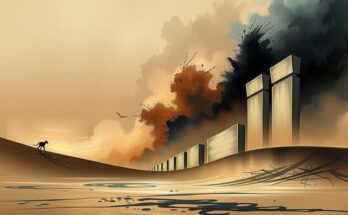Protests in Kinshasa against M23 rebel offensives led to the vandalism of foreign embassies. Protesters accused Rwanda and Uganda of supporting the rebels, demanding accountability from the international community. The demonstration, spurred by a youth collective, involved burning tyres and looting embassies, reflecting deep frustration over ongoing conflicts in DR Congo.
On Tuesday, protests erupted in Kinshasa, Democratic Republic of the Congo (DR Congo), as rioters stormed various embassies in response to the ongoing M23 rebel offensives. Demonstrators expressed their frustration with the perceived inaction of the international community regarding the escalating conflict in the eastern city of Goma. The protests featured vandalized embassies and burning tyres as hundreds of citizens took to the streets, indicating the widespread anger regarding the situation.
The protests were a reaction to the collective call “Paralyse the City,” initiated by a youth group. Demonstrators mobilized in the affluent district of Gombe and specifically targeted the embassies of Rwanda, Uganda, Kenya, France, Belgium, and the United States. The unrest followed the M23’s recent advance into Goma, where they captured key locations, including the airport, following violent clashes.
Protesters accused Rwanda and Uganda of providing support to the armed group M23. One demonstrator, amid the chaos, proclaimed, “Enough is enough, we’re going to destroy everything here. Today, we’re going to finish with Rwanda,” reflecting the intense sentiment present among the gathering crowds. Thick smoke filled the air as tyres burned, and the perimeter of the French embassy was also set ablaze, decorated with graffiti denouncing prolonged betrayal.
Additionally, protesters vandalized the embassies of Belgium and the United States while looting the Ugandan diplomatic mission, removing furniture with motorcycles and taxis. The event underscored the palpable frustration within the community regarding both internal and external factors contributing to their plight. The unrest signifies a critical moment in DR Congo’s socio-political landscape as citizens demand accountability and action.
The protests in Kinshasa are rooted in the broader conflict occurring in the Democratic Republic of Congo, particularly in the eastern regions, where the M23 armed group has been advancing. This conflict has drawn international attention due to the involvement of neighboring countries, notably Rwanda and Uganda, which are accused of backing the rebels. The unrest in Kinshasa reflects the discontent and desperation of the populace regarding the lack of effective international response to their plight.
The recent protests in Kinshasa against international embassies highlight the growing frustration among Congolese citizens concerning the ongoing violence linked to the M23 group and the apparent inaction of foreign governments. As demonstrators express their anger through acts of vandalism, the situation points to profound socio-political instability in the region and the urgent need for focused international intervention.
Original Source: www.aljazeera.com




